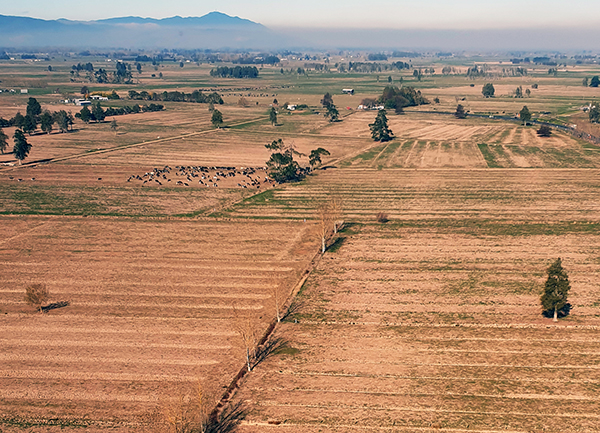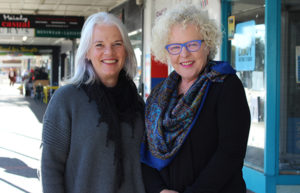By Teresa Ramsey
It wasn’t until dairy farmer Rachael Aitchison saw her farm from the air that she realised the severity of the drought gripping the Hauraki Plains.
The photos she took during a helicopter ride over the property on May 22 shocked a lot of people, she said.
“It doesn’t look that bad from on the ground but when you actually get up there and you see that, it’s a bit mindblowing.”
The photos revealed the worst drought conditions she and husband Brent had seen in the 25 years they’d farmed their two dairy farms near Ngatea, she said.
“We’ve had droughts but not going into the end of May,” she said.
“We’ve had feed and we’ve had systems in place, but when it goes on this long … no-one can plan for a drought that goes for seven months. It’s unheard of for us here.
“There is this pocket in the central Hauraki Plains that rain has just dodged since November. We watch it, it goes through the Firth of Thames and to Te Aroha.”
The couple usually farm a total of 1050 dairy cows on their 155ha and 195ha farms, but because of the drought, they have had to cut cow numbers to just 800.
Despite the cut in cow numbers, the Aitchisons supplementary feed bill this season has still skyrocketed because of the drought.
“It’s superseding any budget or expectations – at the moment, over and above our normal feed budget, we would have spent $250,000,” she said.
The cows were “just holding” their condition despite drying off in early April instead of the end of May because of the lack of feed.
“These cows are due to start calving in six weeks. We’re having to put pretty serious systems in place for the start of calving so we’ll be looking at starting them just milking once a day as opposed to twice a day. So straight away there’s production cuts.”
The drought had caused some sleepless nights, she said.
“Our staff seem to be coping very well so we’ve really got to focus on looking after our staff, they’re at the forefront of it, they’re the ones feeding the cows. Stress levels are elevated but we are okay, we’re doing alright.
“We’re in contact with a lot of farmers that are surrounding us that are also in this drought condition so we just need to work together and support each other.”
WHERE TO GET HELP:
Rural Support helpline: Ph 0800 787 254
Beef + Lamb 0800 BEEFLAMB (0800 233 352)
DairyNZ 0800 4 DAIRYNZ (0800 4 324 7969)
AgFirst 0508 AGFIRST (0508 243 477)




